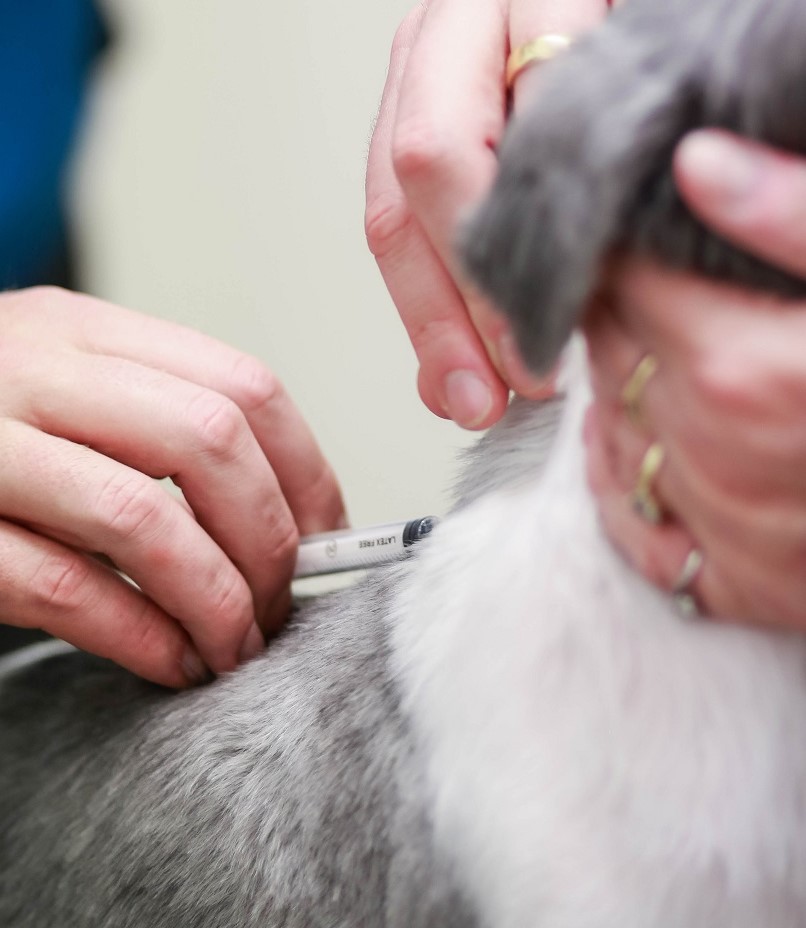
Vaccinations have proved vital in the fight against infectious disease, in both humans and animals. Our team are passionate about preventing disease in our patients, and as such we do recommend vaccination for dogs, cats and rabbits and all our own pets are vaccinated. Our team keeps up to date with the latest guidelines published by the World Small Animal Veterinary Association. The risk of side effects associated with vaccination is very small, but even so we do not believe in vaccinating more than is necessary. In this post we are going to look at the diseases we can vaccinate dogs against.
DHP
This vaccination protects against Distemper, Infectious Hepatitis (adenovirus) and Parvovirus. These are all potentially fatal diseases. Parvovirus outbreaks still occur not infrequently in the UK; it is highly contagious and is spread between dogs via direct contact and also contact with faeces. It can be especially severe in puppies and causes sudden and severe vomiting and diarrhoea. As a vet this disease is absolutely heart-breaking to deal with as it is usually fatal, despite intensive treatment, and is so easily prevented.
After the puppy vaccination course and 1st year booster, dogs are only vaccinated against these diseases every 3 years. It is possible to do ‘titre testing’ for the DHP part of the vaccination. This means taking a blood sample, which is sent to the lab to check whether a dog has a protective level of immune response and whether they need re-vaccination that year. Our vets will be happy to discuss this further with you.
LEPTOSPIROSIS
This is a bacterial infection which affects the kidneys and liver. It is spread by rats and dirty water and can be passed to humans (‘Weil’s disease’). The British Small Animal Veterinary Association Scientific Committee has recommended that leptospirosis should be considered to be a core vaccine for dogs in the UK, as they are at risk of contact with rodents or potentially contaminated water. Protection with this vaccination only lasts for 1 year, which is why we recommend a booster for all dogs every year.
In the past few years it has become possible to vaccinate against 4 strains of leptospirosis (‘L4’), rather than the traditional 2 (‘L2’). We have been using ‘L4’ for a few years now, as we felt it was better to protect against the largest possible number of strains. With the advent of ‘L4’ concerns were raised on social media about a possible increase in side effects – the Veterinary Medicines Directorate receives reports of any ‘adverse events’ and responded to these concerns in 2017.
It is not possible to do ‘titre testing’ for the leptospirosis vaccination.
KENNEL COUGH
This is caused by a number of different viruses and bacteria. It is spread via the air and also anywhere dogs meet nose to nose, such as at kennels, at the park, training class etc. Symptoms include a dry, harsh cough – often misinterpreted as the dog having “something stuck in their throat”. Kennel Cough vaccination protects against two common causes of Kennel Cough (Parainfluenza virus and Bordetella Bronchiseptica bacteria), but not all possible causes. This is an optional vaccination and is administered via your dog’s nostril. It is worth getting vaccinated against, especially if your dog mixes with lots of other dogs. Your dog may need it before going into kennels, as most kennels demand it is done at least 2 weeks prior to kennelling. Protection only lasts a year, so a yearly booster is recommended.
OTHER VACCINATIONS
- Rabies – this is a fatal disease of the nervous system, which is currently not present in the UK. If you wish to take your pet abroad with you, they will need to have a rabies vaccination.
- Leishmaniasis – dogs that are travelling to parts of southern Europe may benefit from vaccination against a disease called Leishmaniasis; the vet will be able to advise further.
- Lyme Disease – it is possible to vaccinate dogs against this disease, which is transmitted by ticks. It is worth considering if your dog walks in areas with lots of ticks,
SIDE EFFECTS OF VACCINATIONS
Side effects of vaccinations are not common, but the vet will be happy to discuss them with you if you have any concerns. Puppies may be quiet for a day and may get a raised temperature. Sometimes a non-painful swelling can appear at the site of injection. More severe side effects are very rare (less than 1 in 10,000 animals) and include immune-mediated disease and allergic reactions. The benefits of vaccination far outweigh any side effects in the vast majority of dogs.
We always take the opportunity at a vaccination appointment to do an ‘annual health check’, giving your dog an examination and asking you questions to help keep them fit and healthy.
We hope this is a useful post, and will be happy to answer any further queries.
Dr Laura Mather MRCVS, vet at Greenbay Vets in Torquay and Paignton

Do you consider doing blood test and checking for antibodies before booster vaccine? Thank you
Thank you for your message. We can do a blood test to check antibody levels (titre testing) prior to giving the DHP booster (distemper, hepatitis and parvovirus). It is not possible to check immunity against leptospirosis in this way, so an annual booster is currently recommended for this disease in most dogs.